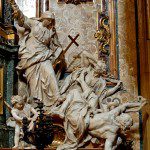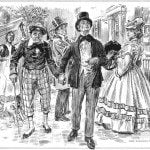What is important for us is a different question: what are we going to do with ourselves today, in the world we live in today, in the circumstances we find ourselves in today. We cannot control the past. We cannot undue it. We cannot know all the reasons why things are as they are today. But we do know that we are called to act, doing the best we can in cooperation with God’s grace. The question of what has happened, what is the cause of the condition we live in today, is often a distraction, causing us to reflect upon the past instead of to concern ourselves with the present and improving the way things are in the future. When we are too concerned about the question of why things are as they are, we ignore what we should be doing. Certainly, if we find ourselves in a position where we are required to work for others and help create better conditions in the world, we need to speculate and do what we can to change the system for the better, but even then we need not to get too attached to our answer, thinking it comprehends more than it does of the conditions which underlie the way things work in the world. They are to be used to encourage us to do better, but when they distract us from our spiritual development, from becoming better people, working for a better world, we must shrug them off and go back to work, cooperating with God, being led by him to doing what needs to be done in the moment for our proper spiritual progression.
It is way too easy for us to be asking useless questions and use them as excuses to avoid our spiritual development. Spiritual masters have long indicated this through all kinds of analogies, indicating how misplaced the question can be for our own good. Siddhartha, for example, said such questions are like someone being shot by a poisoned arrow, seeking to find who shot the arrow and why they were shot instead of taking out the arrow and finding the right antidote to the poison:
If anyone should say thus: ‘I will not lead the holy life under the Blessed One until the Blessed One declares to me “the world is eternal”… or “after death a Tathagata neither exists nor does not exist,” that would still remain undeclared by the Tathagata and meanwhile that person would die. Suppose, Malunkyaputta, a man were wounded by an arrow thickly smeared with poison, and his friends and companions, his kinsmen and relatives, brought a surgeon to treat him. The man would say: ‘I will not let the surgeon pull out this arrow until I know whether the man who wounded me was a noble or a brahmin or a merchant or a worker.’ And he would say: ‘I will not let the surgeon pull out this arrow until I know the name and clan of the man who wounded me;… until I know whether the man who wounded me was tall or short or of middle height;… until I know whether the man who wounded me was dark or brown or golden-skinned;… until I know whether the man who wounded me lives in such a village or town or city;… until I know whether the bow that wounded me was a long bow or a crossbow; . . .until I know whether the bowstring that wounded me was fibre or reed or sinew or hemp or bark;… until I know whether the shaft that wounded me was wild or cultivated;… until I know with what kind of feathers the shaft that wounded me was fitted – whether those of a vulture or a crow or a hawk or a peacock or a stork;. ..until I know with what kind of sinew the shaft that wounded me was bound – whether that of an ox or a buffalo or a lion or a monkey;… until I know what kind of arrow it was that wounded me – whether it was hoof-tipped or curved or barbed or calf-toothed or oleander.’
All this would still not be known to that man and meanwhile he would die.[3]
![Satan Smiting Job by William Blake [Public domain], via Wikimedia Commons](https://wp-media.patheos.com/blogs/sites/637/2016/12/Blake_Book_of_Job_Linell_set_6-300x251.jpg)
If, when we are sick, we went to a doctor, asking all kinds of questions which are unrelated to our predicament, or we sought to counter the doctor’s wise prescription with foolhardy speculations which risk making our ailment worse, would we not be the cause of our own pain and suffering? The same, spiritually, is the case with God, who understands more of what we need than we ourselves do, for he knows and comprehends us better than we do ourselves. Instead of placing all these questions between us and him, we should empty ourselves of them as the distractions that they are, so that trusting in God, we can truly work out our salvation with much fear and trembling.
St. Anthony, the great spiritual leader, showed us by this saying that we should not be too concerned that we find ourselves tempted to ask these questions. Even great saints on their path of salvation find themselves distracted by them. The key is to realize that when they come up and distract us from our walk with God, we must empty ourselves of them. We must stop ourselves from attempting to construct explanations and develop unseemly philosophical systems as a way to try to control not just ourselves, but the world at large. Instead, we must let go and let God be at work with us so that what God’s wisdom plans for us can take effect. We must focus on what we are doing, making sure that we not only avoid vice, but also that we grow in virtue. When we put our trust in God in what happens outside of ourselves, what lies outside of our control, this frees us to truly work with God and do what we need to do moment to moment so that we not only follow God, but we can end up pleasing him because of our unending trust in him. This is exactly the intent behind Jesus’ words when he said:
Look at the birds of the air: they neither sow nor reap nor gather into barns, and yet your heavenly Father feeds them. Are you not of more value than they? And which of you by being anxious can add one cubit to his span of life? And why are you anxious about clothing? Consider the lilies of the field, how they grow; they neither toil nor spin; yet I tell you, even Solomon in all his glory was not arrayed like one of these. But if God so clothes the grass of the field, which today is alive and tomorrow is thrown into the oven, will he not much more clothe you, O men of little faith? Therefore do not be anxious, saying, `What shall we eat?’ or `What shall we drink?’ or `What shall we wear?’ For the Gentiles seek all these things; and your heavenly Father knows that you need them all. But seek first his kingdom and his righteousness, and all these things shall be yours as well. “Therefore do not be anxious about tomorrow, for tomorrow will be anxious for itself. Let the day’s own trouble be sufficient for the day (Matt. 6:26-34 RSV).
When we are anxious over the things of the world, we are no longer concerned with our spiritual progression. The thoughts, the worries, which come into our mind clog it up; we must let them go, we must silence them all, so that in our prayers we do not go to God with such distractions, but rather, we go to him in love, and await in silence the still, small voice of his response which would be cut off in all that loud questioning. This, then, will provide to us, as it provides to all, the real answer; by finding what we should be doing, by concerning ourselves with the present moment and what we should be doing in it, we will be working for the betterment not only of ourselves, but the world, for by our spiritual improvement we will be creating the conditions which actually improve the rest of the world with us.
[1] The Sayings of the Desert Fathers. trans. Benedicta Ward (Kalamazoo, MI: Cistercian Publications, 1984),2.
[2] St. John Chrysostom, “Commentary on Job” in Commentaries on the Sages. Volume One. trans. Robert Charles Hill (Brookline, MA: Holy Cross Orthodox Press, 2006), 187.
[3] The Middle Length Discourses of the Buddha. trans. Bhikkhu Nanamoh and Bhikkhu Bodhi (Boston: Wisdom Publications, 1995), 534-5.
Stay in touch! Like A Little Bit of Nothing on Facebook:
A Little Bit of Nothing













